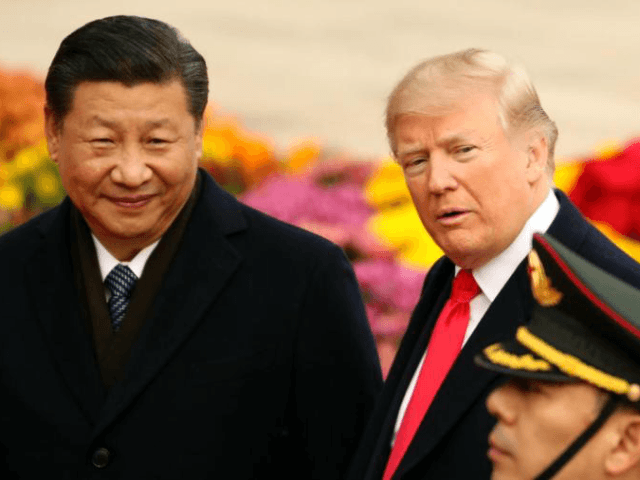The Chinese government’s media arm has reacted with outrage to President Donald Trump’s offer to mediate talks between the various claimants in the South China Sea, where Beijing has dedicated years to constructing sophisticated military outposts in Philippine and Vietnamese waters.
Trump made the offer to mediate to President Tran Dai Quang while in Vietnam attending the Asia Pacific Economic Cooperation (APEC) summit last week.
On Tuesday, the Global Times, a Chinese state outlet, published a column accusing Trump of making a “boastful offer” that could destabilize the region, which Beijing alleges is currently peaceful despite growing alarm from the Philippines, Brunei, Taiwan, Indonesia, Vietnam, and Malaysia that China may box them out of their own sovereign waters.
The Times argues that Trump received a “tepid response” from both Vietnam and the Philippines for his offers, and that China has no desire to involve him in the matter, “obviously.”
“Washington has already been too active in the South China Sea issue,” the column goes on. “During the Obama era, US intervention in South China Sea affairs reached a climax. It is unknown if Trump’s self-recommendation is a result of his impulsive style or comes from careful consideration of the issues.”
The piece concludes that the United States is the source of all tensions in the region and warns rival claimants in the region that they do not want “to fall into the orbit of colluding with the U.S. and countering China.”
Trump had offered in conversation with the Vietnamese leader to serve as a mediator. “If I can help in any way, I’m a very good mediator and a very good arbitrator,” Trump said, adding, “I have done plenty of it from both sides. So if I can help you, let me know.”
In its official response, the Chinese Foreign Ministry abstained from insulting Trump’s alleged “impulsive” nature.
“China’s position on the South China Sea issue is consistent and clear,” spokesman Geng Shuang told reporters on Monday. “China is resolute in safeguarding its territorial sovereignty and maritime rights and interests in the South China Sea. Meanwhile, China is committed to resolving the relevant disputes with countries directly concerned through dialogue and consultation and firmly maintaining peace and stability in the South China Sea.”
Geng described tensions in the South China Sea as “generally improving” and urged “countries outside the region” to “respect the efforts made by regional countries to maintain peace and stability in the South China Sea.”
Trump did not publicly mention the South China Sea dispute while visiting Xi Jinping in Beijing. Secretary of State Rex Tillerson told reporters, however, that he and his Chinese counterparts did have “a frank exchange here in China on maritime security issues and the South China Sea.” He did not elaborate on the outcome of those exchanges.
While none of the countries involved in the dispute publicly accepted Trump’s offer, his pivot away from militarily challenging China—the United States regularly conducts Freedom of Navigation Operations (FONOPs) in the South China Sea to assert the freedom of international waters—could change the dialogue around the dispute. As Quartz notes, some experts suggest that inserting Trump as a mediator into the dispute could be “one of the few good options on the table” for these nations, which are all significantly smaller than China and pose little military challenge to the Asian nation. The analysis argues that Vietnam and the Philippines could, at any time, reach out to Trump for mediation if they feel China has colonized too much of their territory.
China has built artificial islands and equipped them with vast military arsenals in the Spratly and Paracel Islands, which by international law are partly the sovereign territory of Vietnam and the Philippines. China insists it has only placed civilian research assets there, but satellite image studies show fighter jets, surface-to-air missiles, and advanced surveillance equipment in the region. China has also changed its school curricula to teach children that the disputed areas of the sea are indisputably part of the Chinese state.
Philippine President Rodrigo Duterte told reporters this weekend that, in conversation, Xi told him that the expansive buildup was “nothing” and to not worry about it.

COMMENTS
Please let us know if you're having issues with commenting.